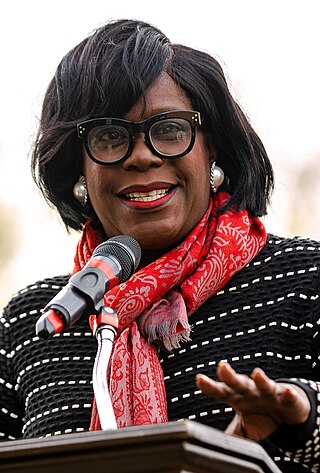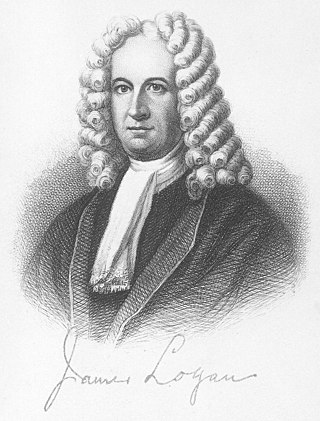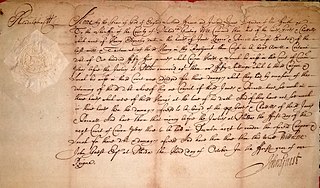Related Research Articles

Benjamin Chew was a fifth-generation American, a Quaker-born legal scholar, prominent and successful Philadelphia lawyer, slaveowner, and chief justice of the Supreme Court of the Province of Pennsylvania and later the Commonwealth of Pennsylvania. Chew was known for precision and brevity in his legal arguments and his excellent memory, judgment, and knowledge of statutory law. His primary allegiance was to the supremacy of law and the constitution.

The city of Philadelphia was founded in 1682 by William Penn in the English Crown Province of Pennsylvania between the Delaware and Schuylkill rivers. Before then, the area was inhabited by the Lenape people. Philadelphia quickly grew into an important colonial city and during the American Revolution was the site of the First and Second Continental Congresses. After the Revolution the city was chosen to be the temporary capital of the United States. At the beginning of the 19th century, the federal and state governments left Philadelphia, but the city remained the cultural and financial center of the country. Philadelphia became one of the first U.S. industrial centers and the city contained a variety of industries, the largest being textiles.

John Dickinson, a Founding Father of the United States, was an attorney and politician from Philadelphia, Pennsylvania, and Wilmington, Delaware. Dickinson was known as the "Penman of the Revolution" for his twelve Letters from a Farmer in Pennsylvania, published individually in 1767 and 1768, and he also wrote "The Liberty Song" in 1768.

The mayor of Philadelphia is the chief executive of the government of Philadelphia, Pennsylvania, as stipulated by the Charter of the City of Philadelphia. The current mayor of Philadelphia is Cherelle Parker, who is the first woman to hold the position.

Andrew Hamilton was a Scottish lawyer in the Thirteen Colonies who settled in Philadelphia. He was best known for his legal victory on behalf of the printer and newspaper publisher John Peter Zenger. His involvement with the 1735 decision in New York helped to establish that truth is a defense to an accusation of libel. His eloquent defense concluded with saying that the press has "a liberty both of exposing and opposing tyrannical power by speaking and writing truth."

James Logan was a Scots-Irish colonial American statesman, administrator, and scholar who served as the fourteenth mayor of Philadelphia and held a number of other public offices.

Edward Shippen was the second mayor of Philadelphia, although under William Penn's charter of 1701, he was considered the first.

The Powel House is a historic house museum located at 244 South 3rd Street, between Willings Alley and Spruce Street, in the Society Hill neighborhood of Philadelphia, Pennsylvania. Built in 1765 in the Georgian style, and embellished by second owner Samuel Powel (1738–1793), it has been called "the finest Georgian row house in the city." As with other houses of this type, the exterior facade is understated and simple, but the interior was elaborately appointed.
Anthony Morris Jr. was a brewer, Quaker preacher, judge, and mayor of Philadelphia.

David Lloyd was an American lawyer and politician from Chester, Pennsylvania. He was the first Attorney General of the Province of Pennsylvania and a member of the popular party. He served 9 terms in the Pennsylvania General Assembly, including 9 terms as its Speaker, and 14 years as Chief Justice of the Pennsylvania Supreme Court.

John Guest was a Chief Justice of the provincial Pennsylvania Supreme Court.

Isaac Norris was a merchant, slave trader and prominent figure in provincial Pennsylvania, including mayor of Philadelphia in 1724.
Richard Hill was an English merchant seaman who emigrated to the Maryland colony in 1673, moved to Pennsylvania in 1703, and subsequently served four terms as the 8th and 13th mayor of Philadelphia.
Samuel Preston was a jurist, merchant, and mayor of Philadelphia.
The Philadelphia Election Riot in 1742 was a riot that occurred due to political disagreements among the constituents of the increasingly diverse population in the city. Politics in Pennsylvania, including Philadelphia, had long been dominated by the Quakers but, with their political dominance increasingly threatened by the predominantly Anglican Proprietary Party, tensions grew in the city. The Quakers and Anglicans were predominantly led by Isaac Norris II and William Allen, both of whom were well respected and held significant political power. In an attempt to swing the vote, the Proprietary Party "hired armed sailors" to disrupt the Quakers who, in their own attempt, were bringing "unnaturalized Germans from the country to vote." On voting day, October 1, 1742, violence broke out between the two sides.

William Penn was an English writer, religious thinker, and influential Quaker who founded the Province of Pennsylvania during the British colonial era. Penn was an advocate of democracy and religious freedom known for his amicable relations and successful treaties with the Lenape Native Americans who had resided in present-day Pennsylvania prior to European settlements in the state.

Samuel Carpenter was a Deputy Governor of colonial Pennsylvania. He signed the historic document "The Declaration of Fealty, Christian Belief and Test" dated 10 September 1695; the original is in the Historical Society of Pennsylvania. Samuel was also called the "First Treasurer" of Pennsylvania, and was a partner and friend of proprietor William Penn.

The Newlin Mill Complex, also referred to as The Newlin Grist Mill, is a water-powered gristmill on the west branch of Chester Creek near Concordville, Pennsylvania built in 1704 by Nathaniel and Mary Newlin and operated commercially until 1941. During its three centuries of operation, the mill has been known as the Lower Mill, the Markham Mill, the Seventeen-O-Four Mill and the Concord Flour Mill. In 1958 the mill property was bought by E. Mortimer Newlin, restored and given to the Nicholas Newlin Foundation to use as a historical park. Water power is still used to grind corn meal which is sold on site. The park includes five historical buildings, which were added to the National Register of Historic Places in 1983, and 150 acres (61 ha) of natural woodland.
Thomas Masters was the mayor of colonial Philadelphia from 7 October 1707 to October 4, 1709, before Richard Hill, and after Nathan Stanbury.
Joseph Willcox was the fifth mayor of Philadelphia, serving from October 2, 1705, to October 1, 1706.
References
- ↑ "Mayors of Philadelphia". 2021-02-22. Archived from the original on 2021-02-22. Retrieved 2023-10-25.
- 1 2 3 4 Toogood, Anna Coxe. Historic Resource Study - Independence Mall, The 18th Century Development, Block One, Chestnut to Market, Fifth to Sixth Streets (August 2001)
- ↑ "Historical List of Supreme Court Justices". The Unified Judicial System of Pennsylvania.
- 1 2 Memorial History of the City of Philadelphia, Vol. 1, pp. 184-85 (1895)
- ↑ Anderson's Appeal (1906 court decision)
- ↑ The Griffith Jones House, The Library Company of Philadelphia, Retrieved 7 March 2022
